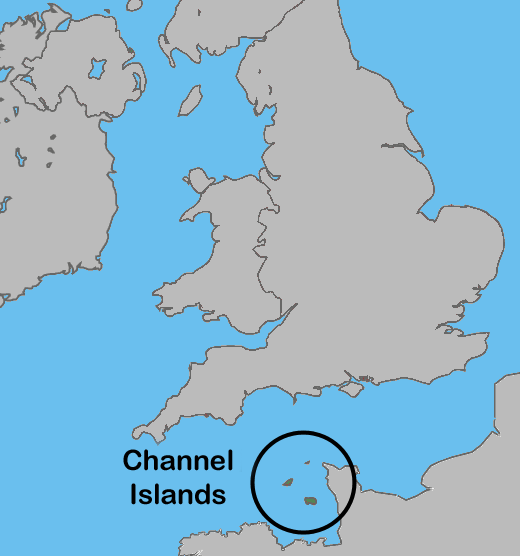 The Channel Islands (Norman: Îles d’la Manche, French: Îles Anglo-Normandes or Îles de la Manche) are an archipelago of British Crown Dependencies in the English Channel, off the French coast of Normandy. They include two separate bailiwicks: the Bailiwick of Guernsey and the Bailiwick of Jersey, neither of which is part of the United Kingdom; rather they are considered the remnants of the Duchy of Normandy. They have a total population of about 158,000 and their respective capitals, St. Peter Port and St. Helier, have populations of 16,488 and 28,310. The total area of the islands is 194 km².
The Channel Islands (Norman: Îles d’la Manche, French: Îles Anglo-Normandes or Îles de la Manche) are an archipelago of British Crown Dependencies in the English Channel, off the French coast of Normandy. They include two separate bailiwicks: the Bailiwick of Guernsey and the Bailiwick of Jersey, neither of which is part of the United Kingdom; rather they are considered the remnants of the Duchy of Normandy. They have a total population of about 158,000 and their respective capitals, St. Peter Port and St. Helier, have populations of 16,488 and 28,310. The total area of the islands is 194 km².
The Bailiwicks have been administered separately from each other since the late 13th century, and although those unacquainted with the islands often assume they form one political unit, common institutions are the exception rather than the rule. The two Bailiwicks have no common laws, no common elections, and no common representative body (although their politicians consult regularly). There is no common newspaper or radio station, but a common television station, ITV Channel Television, as well as a common BBC television news opt-out BBC Channel Islands News.
A part of Normandy in the 10th century AD, the islands came under British rule at the time of the Norman Conquest in 1066. The islets of Ecrehous and Les Minquiers were disputed between England and France until 1953, when the International Court of Justice confirmed British sovereignty. The dispute revived in the late 20th century because sovereignty determines the rights to the continental shelf’s economic development (especially petroleum). The Channel Islands were the only British territory occupied by Germany in World War II. The islands are famous for their cattle breeds, including the Jersey and Guernsey.
Culturally, the Norman language predominated in the islands until the 19th century, when increasing influence from English-speaking settlers and easier transport links led to Anglicisation. There are four main dialects/languages of Norman in the islands, Auregnais (Alderney, extinct in late 20th century), Dgèrnésiais (Guernsey), Jèrriais (Jersey) and Sercquiais (Sark, an offshoot of Jèrriais).
Victor Hugo spent many years in exile, first in Jersey and then in Guernsey, where he wrote Les Misérables. Guernsey is also the setting of Hugo’s later novel, Les Travailleurs De La Mer (The Toilers of the Sea). A “Guernsey-man” also makes an appearance in Herman Melville’s Moby-Dick.
The annual “Muratti,” the inter-island football match, is considered the sporting event of the year—although, due to broadcast coverage, it no longer attracts the crowds of spectators, travelling between the islands, that occurred during the 20th century.
Tourism is the major industry in the smaller islands (with some agriculture). Jersey and Guernsey have, since the 1960s, relied on financial services. Guernsey’s horticultural and greenhouse activities have been more significant than in Jersey, and Guernsey has maintained light industry as a higher proportion of its economy than Jersey. Jersey’s economy since the 1980s has been substantially more reliant on finance.
Both Bailiwicks issue their own banknotes and coins, which circulate freely in all the islands alongside UK coinage and Bank of England and Scottish banknotes.
There are many exports, largely consisting of crafted goods and farmed produce. The Genuine Jersey Products Association certify products as being locally made/sourced.
Notes from Wikipedia and Answers.com









